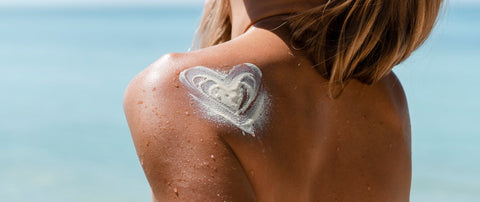The vacation season is approaching and once again we are all looking forward to being able to switch off and give our bodies the rest they need. When you arrive at your dream vacation destination, you suddenly realize that something is slowly starting to happen and your body is trying to fight something: gastrointestinal upsets, colds and fever. People often fall ill on their long-awaited vacation - but why is that? That's exactly what we want to explain in this article. We will also give you valuable tips on how you can support your immune system and gut before and during your trip.
Inhaltsverzeichnis
Why traveling is particularly hard on the immune system
We've all been there: the vacation has been booked for a long time and the anticipation is huge. But as soon as the long-awaited vacation is just around the corner, you suddenly fall ill. Worse still, you catch something nasty during your vacation, can't stomach the food or simply can't get going due to exhaustion. Unfortunately, this is a far cry from relaxing evenings, nice walks on the beach, swimming in the sea and delicious meals. But why does our body react like this? After all, we have coped well with the stress of everyday life and work at home - without getting sick.
The reasons are varied and a combination of several factors. We often fall ill right at the start of our vacation. During the journey or flight, we notice how a cold slowly but surely starts to set in. This is often due to the stress of preparation. Doing the final shopping, packing suitcases, making preparations, thinking about little things - these are things that occupy us intensively before the vacation and cause us a lot of stress. Our bodies are running at full speed while we are already splashing around in the sea in our minds. During this time, our body releases the stress hormones cortisol and adrenaline. However, high levels of stress hormones can weaken the immune system, giving pathogens a free rein. However, when the body finally shuts down and goes into recovery mode, the infections that have been held back so far can break out. The result: the immune system weakens and we fall ill. In an interview with Peter Henningsen, Head of Psychosomatics at the Technical University of Munich, which was published in the Süddeutsche Zeitung, the following can be read: "Under high stress, the body is busy maintaining all functions, and the first subtle symptoms are not so easily noticed in this phase." Peter Henningsen adds: "When the stress subsides, however, the symptoms become apparent." 1
To avoid such situations, it is important to take care of your body in good time and not to strain it. Important tasks and preparations can also be completed without stress if you start them early.
But it's not just the pre-holiday period that puts a strain on our bodies; major changes in climate, changing time zones and different foods and eating habits can also put additional strain on the body and the immune system. Another point is that the body comes into contact with new, previously unknown viruses, bacteria, fungi and the like, which our immune system can only fight to a limited extent or with a delay. In addition, sleep deprivation and sleep problems can occur due to jet lag or a generally unfamiliar sleeping environment with a lack of routines. Lack of sleep is also associated with weakening the immune system, as the body is unable to regenerate sufficiently. In addition to gastrointestinal complaints or infections, sudden allergies, skin rashes and general malaise can also put a strain on the vacation period.
Preparation is everything: tips for the time before the trip
To make your trip as pleasant as possible and to protect your immune system and gut, we have put together a few tips for you:
-
Healthy diet
A nutritious diet is also important before traveling to strengthen the body and the immune system. The diet should preferably be balanced and varied. Foods rich in vitamin C in particular can support the immune system. The minerals zinc, selenium and iron are also essential for a strong immune system. Fruit, vegetables, proteins and healthy fats in particular provide your body with everything it needs. For a healthy gut, it is advisable to eat fiber-rich and probiotic foods such as fermented fruit and vegetables.

-
Stress management
Stress is often the reason why we fall ill - even when we are not on vacation. It is therefore important to deal with stressful situations as well as possible. Many people tend to want to get everything done quickly when preparing for a vacation and don't realize that they are actually completely overwhelmed. In this case, rest breaks and to-do lists can help. Early preparation can also help to avoid stressful last-minute errands.
-
Vaccinations due
To ensure comprehensive protection, certain vaccinations are recommended for some destinations. These are recommended by the Standing Committee on Vaccination (STIKO) and the German Society for Tropical Medicine, Travel Medicine and Global Health (DTG). Vaccinations that are frequently administered on long-distance trips include hepatitis A and B and rabies. A little tip: also check your standard vaccinations such as tetanus or hepatitis B and update them if necessary. If you are unsure, we advise you to consult your doctor.
-
Prophylaxis
Gastrointestinal illnesses can be very common on vacation. The prophylactic intake of prebiotics and probiotics is therefore often recommended to support the gut in advance.
-
Prebiotics
Prebiotics can promote the growth of beneficial intestinal bacteria, while probiotics contain live bacterial strains that positively enrich the intestines. This combination can also help with travel sickness. Another well-known prophylaxis is the prophylactic intake of medication prescribed to protect against malaria. However, this only applies when traveling to a malaria area.
-
First-aid kit
This raises the question of all questions before you go on vacation: What medication should I take with me? It is important that your first-aid kit is tailored to your needs. However, you should also take into account your destination and the duration of your trip in order to estimate the amount of medication you need - because more is more! In principle, medication for nausea, constipation, diarrhea, fever or pain should always be packed. Bandages, plasters, disinfectant, gloves and insect repellent spray are also essential. Suitable sun protection with appropriate UV protection should also always be included.
If you have any questions or would like more detailed advice on the subject of first-aid kits, you are welcome to discuss this at your next visit to the doctor.
Why digestion suffers the most
In some countries, water quality does not meet the standards we are familiar with in Germany.
The water can therefore contain unknown viruses, bacteria or parasites. This can lead to gastrointestinal illnesses, which we have certainly all experienced on vacation. In fact, gastrointestinal infections are more common on vacation than you might think. Constipation, flatulence and abdominal pain are also common. A good example of this is the so-called Bali Belly - a term for gastrointestinal complaints which, as the name suggests, is very common among Bali vacationers. The symptoms can be long-lasting and even last until the end of the stay.
To avoid these unpleasant events, there are a few things to bear in mind. Here are a few tips for healthy digestion on vacation:
- Observe hygiene regulations Boil water
- No ice cubes
- Only peeled fruit
- It is best to avoid foods that come into contact with water, e.g. lettuce, apples with skin, etc.
- Do not drink water from the pipes
- Water should only be consumed from industrially filled bottles
- High-fiber food
- Enjoy easily digestible food: no fatty and heavy dishes Prefer smaller portions and eat several times
- Wash your hands regularly and thoroughly
-
Drink a lot to keep the digestive tract going
-
In case of symptoms such as vomiting, drinks containing electrolytes can help to keep the electrolyte balance in equilibrium
- Eat fatty and highly seasoned foods slowly so that your stomach can get used to them
-
Prefer restaurants that are well frequented and hygienic
-
Plenty of exercise: In hot weather, swimming in particular can be very good for your circulation and stimulate your metabolism
Supplements as support
In addition to a healthy diet and other travel preparations, there is also the option of strengthening your body with nutritional supplements. The benefits: Specially selected vitamins, minerals or probiotics can be used specifically to support your immune system, metabolism, digestion or microbiome. Especially when traveling, it is also practical to have handy supplements with you that can be optimally combined with each other. You should therefore include the following supplements in your first-aid kit in future:
Probiotics
A course of probiotics should be taken several weeks in advance. About 4 weeks are sufficient to promote the colonization of the bacterial strains in the intestine. It is important to continue the treatment during your stay and after your vacation. The added microorganisms can support your intestinal flora and digestion in the long term.
The effect of probiotics has also proven effective against traveler's diarrhea: Here, several studies reported that various probiotics, including Saccharomyces boulardii and a mixture of Lactobacillus acidophilus and Bifidobacterium bifidum, showed significant efficacy. None of the 12 studies reported side effects. Thus, probiotics may be a safe and effective method for the prevention of travelers' diarrhea. 2
There is ample evidence that probiotics can further help with acute infectious diarrhea, antibiotic-associated diarrhea, Clostridium difficile-associated diarrhea, hepatic encephalopathy, ulcerative colitis, irritable bowel syndrome, functional gastrointestinal disorders, and necrotizing enterocolitis. 3
Digestive complex
Due to their composition, these preparations can promote digestion and support the intestinal mucosa. They can provide relief, especially for constipation, flatulence and an annoying feeling of fullness.
Our N°13 Colon Complex contains supportive plant extracts such as caraway and fennel as well as psyllium husks, which gently stimulate digestion. Psyllium husks consist of dietary fibers that can swell strongly on contact with liquid. They are known to provide a pleasant feeling of satiety and have a positive effect on digestion. Psyllium husks are also used to relieve irritable bowel syndrome.
Anzeige

An in-vitro study from 2009 found that various essential oils, including caraway, are particularly suitable for combating an imbalance of harmful intestinal bacteria without damaging the beneficial bacteria. Caraway has therefore been used for a very long time to treat gastrointestinal complaints. 4
Fennel has also been touted as a medicinal herb for several hundred years and is said to help with intestinal disorders and general digestive support. One study came to the conclusion that the barrier function of the gastrointestinal tract is actually improved by fennel seeds. A disturbed barrier function cannot sufficiently prevent harmful substances from entering the body. This can lead to inflammatory diseases of the intestine. This potential can be used to provide an alternative or complementary therapy for inflammatory bowel disease. 5
Multivitamins
Multivitamin supplements are an excellent option for taking several vitamins and minerals at the same time. They are already dosed to cover your daily requirement of the most important nutrients.
To investigate the effect of a multivitamin supplement, a study was conducted in which older healthy adults took a multivitamin and mineral supplement for 12 weeks. The supplementation improved the vitamin C and zinc levels in the blood. The subjects also reported improved health. 6
This result shows that combined micronutrients can certainly provide support in improving the immune system.
Antioxidants
Antioxidants protect the body from free radicals and prevent the development of oxidative stress. This in turn strengthens the body's immune system and helps it to successfully defend itself against harmful intruders such as viruses, bacteria and the like. Vitamin C, selenium and zinc in particular are among the best-known antioxidants. Together, they can neutralize free radicals to prevent cell damage, among other things.
A diet rich in antioxidants can support the immune system and should not be neglected, especially on vacation. Antioxidant foods include honey, berries, nuts, cocoa, green tea, turmeric, apples and grapes.
Why economy sets are particularly suitable for traveling
Food supplement economy kits are particularly advantageous when traveling. Not only do they allow you to take coordinated products that ideally support and complement each other, they are also practical to transport. The products are light, handy and fit into any toiletry bag. Food supplements are also permitted in hand luggage. This is why many travelers opt for this option. The price advantage of economy sets is particularly worthwhile: they are cheaper as a set than buying them individually and are therefore not only worthwhile for supporting your health, but also for your wallet.
Conclusion
To ensure a smooth journey, we can only recommend taking probiotic and digestive supplements as well as antioxidants and immune system boosters. These support your immune system and have also proven to be effective against travel sickness and gastrointestinal complaints. However, you cannot avoid the protective measures that should be taken before and during your trip. A healthy diet, sun protection, a well-prepared first-aid kit and strengthening your gut are the most important aspects to ensure you have an unforgettable vacation.
Sources
- Süddeutsche Zeitung. (2018, August 28). Warum wir im Urlaub oft krank werden. Süddeutsche.de. https://www.sueddeutsche.de/gesundheit/urlaub-krank-1.4119209
- McFarland LV. Meta-analysis of probiotics for the prevention of traveler's diarrhea. Travel Med Infect Dis. 2007 Mar;5(2):97-105. doi: 10.1016/j.tmaid.2005.10.003. Epub 2005 Dec 5. PMID: 17298915.
- Wilkins T, Sequoia J. Probiotics for Gastrointestinal Conditions: A Summary of the Evidence. Am Fam Physician. 2017 Aug 1;96(3):170-178. PMID: 28762696.
- Hawrelak JA, Cattley T, Myers SP. Essential oils in the treatment of intestinal dysbiosis: A preliminary in vitro study. Altern Med Rev. 2009 Dec;14(4):380-4. PMID: 20030464.
- Das B, Rabalais J, Kozan P, Lu T, Durali N, Okamoto K, McGeough MD, Lee BJ, Barrett KE, Marchelletta R, Sivagnanam M. The effect of a fennel seed extract on the STAT signaling and intestinal barrier function. PLoS One. 2022 Jul 8;17(7):e0271045. doi: 10.1371/journal.pone.0271045. PMID: 35802574; PMCID: PMC9269469.
- Fantacone ML, Lowry MB, Uesugi SL, Michels AJ, Choi J, Leonard SW, Gombart SK, Gombart JS, Bobe G, Gombart AF. The Effect of a Multivitamin and Mineral Supplement on Immune Function in Healthy Older Adults: A Double-Blind, Randomized, Controlled Trial. Nutrients. 2020 Aug 14;12(8):2447. doi: 10.3390/nu12082447. PMID: 32823974; PMCID: PMC7468989.




 DE-ÖKO-006
DE-ÖKO-006
